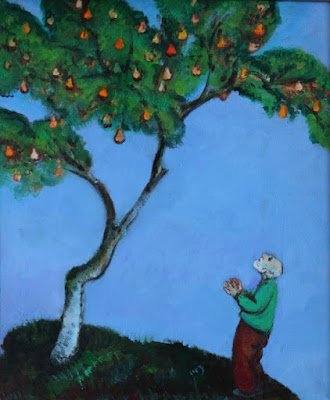 |
| “Waiting for a Pear to Fall” by Jonas Daniliauskas |
The sky is clear
and not a word
floats in the heavens
or on the earth.
It is the time of waiting.
What must be said
has already been said
and we
like perfect fruit,
waiting to be peeled
and consumed.
What remains
in the eating
at the hands
of others?
A last hope
that our insides
will be tasty,
that our sacrifice
will bring life
and health
to a broken state.
David Radavich's poetry collections include two epics, America Bound and America Abroad, as well as Middle-East Mezze and The Countries We Live In. His latest book is Unter der Sonne / Under the Sun: German and English Poems (2022).



